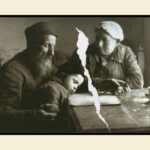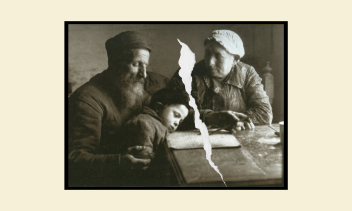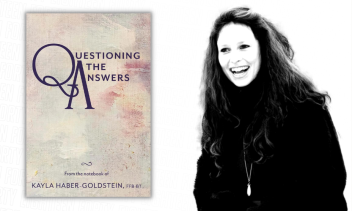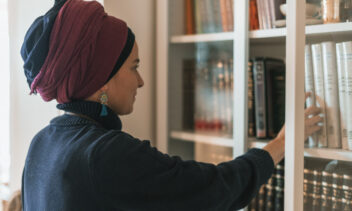Looking back, I’ve had doubts about Judaism festering for years. I never acknowledged them or recognized them before, but now, when I reflect on my journey to this point, I remember pivotal moments dating back years.
It was actually the 2016 election cycle that precipitated closer introspection. I was dismayed to see what appeared to be public figures sidelining their values to protect their influence and income. I was disgusted: How could they sell out on all they purportedly believed in? Then, I had a flash of realization that sent me down the rabbit hole: I was no better than them. I, too, avoided applying critical thinking and intellectual honesty toward my own belief system out of fear of the possible consequences. After that flash of self-awareness, it became much harder to ignore my own doubts, and they began to grow.
It was about a year from that point that I told my husband that I had deep-seated doubts about Judaism that I could no longer ignore.
It was terrifying to tell him. At the time, we were a young yeshivish couple with children, living in an out-of-town community. My husband’s Judaism is central to his life and to the life we shared. I didn’t know how he would react. Would he be supportive or disgusted? Would he remain committed to our marriage or would he immediately want a divorce? When I finally could not bear keeping a secret of this magnitude anymore, I confessed.
He was, thankfully, extremely supportive. I think he was even glad to finally understand what had been eating away at me for so long. He initially had a high level of confidence that if I faced my doubts head-on, did the research, and spoke to the right people, I would end up with my faith stronger than it had ever been. That was my hope, too. And at the same time, it was scary. I remember telling him, “But lots of very, very smart people investigate the evidence and emerge as atheists. Whether they are right or wrong is not the point. How do we know I won’t think that they’re right?”
The analogy I gave at the time was this: Imagine you’re living with consistent stomach pain. It’s extremely uncomfortable. There is a treatment available, which can completely cure the condition. However, if the surgery is unsuccessful, you will be paralyzed and need to eat from a feeding tube for the rest of your life. That’s how I felt about the risk. On the one hand, maybe I would emerge a firecracker alight with emunah. On the other hand, maybe I would end up with no faith at all, no desire to practice, my family in shambles, and everyone I know aghast and devastated.
My husband asked for guidance from one of his rebbeim. His good-hearted but pretty naive suggestion was for me to pair up with a local rebbetzin and learn a sefer on emunah and bitachon. And so the journey began.
Trying to Restore My Faith in Judaism
I started with the go-to kiruv books. Some of them were so poorly argued that it almost seems like the authors are intentionally misleading, which was not helpful. Some of them were OK and gave me food for thought. But none of them gave me any level of confidence in the divinity of the Torah, even if they did leave me open to the possibility of an intelligently guided evolutionary process. I also reached out to several public figures who were extremely generous with their time, for which I was very grateful. Without going into too much detail, the historicity of the Torah began to seem extremely unlikely to me, and without that, I just could not find any reason to believe in its divinity. (I really did try.)
Would I stay living this life that I did not believe in forever, suffocating in silence?
I began frequenting the ex-Mormon forum on Reddit. Mormonism has many sociological similarities to Orthodoxy that made the posts very relatable. They also have extremely close-knit communities, have high expectations of conformity around dress code and lifestyle, and tend to get married young with large(ish) families. And they also have enormous consequences for families of disbelievers. I found great solace in seeing others struggle with their religious tenets, and their experiences echoed my own.
To me, the basis of Mormonism is seriously unconvincing. And yet, the shock, confusion, fear, and self-doubt that besets Mormons who took a second look and said, “Wait a minute…” was eerily familiar. What is obvious to me is terrifying for them. And even more enlightening is the pushback doubters faced from pastors they turned to, who responded in the same manner as some rabbis did to me: “All doubts have their roots in either troubled souls or people just wanting to leave our restrictions behind.” It made me realize how sociologically similar religions are when it comes to keeping people in the fold.
The journey and evolution of my beliefs were absolutely devastating. I didn’t realize until after I lost my faith how greatly my sense of self was predicated on it; how much of my serenity in life was due to the belief that everything was all part of a plan; how much my sense of purpose and drive was tied to fulfilling a mission of God.
Aside from that, there were pragmatic issues that were just as challenging. Would I stay living this life that I did not believe in forever, suffocating in silence? Would I publicly renounce my faith, probably sacrificing my marriage in the process, and cause extreme pain to my parents and massive social consequences to my children? There were no good answers. I remember many, many nights laying in bed at night unable to sleep as I confronted one bad alternative after another. I just could not envision a “future state” that seemed appealing and didn’t involve hurting the people I love.
I eventually discovered a podcast called Marriage on a Tightrope about mixed-faith Mormon marriages, and it made me feel less alone that others were navigating similar challenges, even if the details of it were quite different. The only thing I found disheartening was that in many of the episodes I listened to, the interviewees’ marriages were quite rocky from the onset of one spouse’s faith crisis until the other spouse eventually lost quite a bit of their own faith. And that scenario ultimately seemed both unlikely and unwanted to me. My husband finds tremendous joy and grounding in his faith, and I have no desire to take that from him.
When Authenticity and Raising a Family Conflict
Something I discovered from chatting (anonymously) is that most people need to find some way of being authentic. They go about this in two different ways:
- Being authentic in private, to themselves, by acting in line with their beliefs, which will include not keeping halacha once they no longer believe in it. Some of these people do not share with their spouses that they no longer keep halacha in private. Some of these people have no issues with the “dues” of the frum community and are content to stick with the status quo for the long run.
- Being authentic in public. This will be acknowledging that they don’t really believe in this lifestyle inherently, but they are keeping it for the sake of culture or family. Some of these people will keep halacha all the time, public and private.
Of course, in real life, it’s not quite so binary, and many people find a balance somewhere between these two. But the principle of people needing to experience authenticity in some way holds true.
The trouble for me comes from the fact that neither is possible for me. I can’t bear to be behaving differently publicly and privately. I have a hard enough time feeling like I’m actively defrauding the people around me while not believing in the things that they assume. I would have an even harder time looking in the mirror if I was actually breaking halacha while pretending not to. And feeling like I had to worry about my kids “catching me” doing something is just untenable.
We’ll have to cross each bridge when we get to it and aim to hurt as few people as possible in the process.
However, going public is not really an option either. The social consequences, even if I continued to keep major halachot (going public would probably involve some change of dress) would be absolutely enormous. People would hesitate to eat in my house, our kids would be oddities in school, my parents would be heartbroken. People would talk about us, treat us as outsiders, and possibly ostracize us. So I feel so stuck without a real option for being authentic.
And the worst of that lack of authenticity is with my kids.
One rav who we spoke to told me, “You don’t have to talk about God with your kids that often!” But that is grossly underestimating the situations that come up when I feel conflicted, unsure, and sometimes unethical. They. Are. Constant.
My friend groups reference Hashem all the time. They reference Mashiach’s surely imminent arrival often. I constantly have to run my responses through a “Bais Yaakov” filter to ensure what I’m going to say conforms with the image I am presenting, or at least won’t blow my cover. I bite back snarky responses constantly and roll my eyes in silence. It’s exhausting and suffocating. I find myself retreating from social groups as a consequence.
Then there’s the home front: Parsha questions at the table. Pesach. Questions about Mashiach. About Hashem. Discussions about hashgacha pratis (Divine intervention). There are only so many times you can say, “That’s a great question, why don’t you ask Abba.” And only so many times can I bite my tongue while they get super specific about facts that I am certain are completely ahistorical.
Plus, as my kids get older, even more quandaries arise. How do I juggle wanting my kids to be successful in the system I’ve placed them in, with the fact that my values don’t really align with that system? Like, I don’t daven—ever. And I don’t really care if they do either. But I want my kids to be considered “good kids” by their rebbeim, and the good kids daven, and they usually go to minyan. The “good kids” also learn in at least some of their free time. I’d rather my kids have multiple outlets. But there are real benefits to being considered a good kid.
And then even if I shepherd them successfully through this system, what have I really accomplished? Maybe I’m just setting them up to end up like me—mid-30s, trapped in a life I don’t believe in, with no avenues out that don’t inflict enormous pain.
These considerations are a constant weight on my mind. I don’t have answers.
Making It Work, One Day at a Time
Making the choice to stay was not obvious or easy. There’s a lot I really dislike about many frum communities. I hate the tribalism and the lack of empathy for anyone who is an “other.” I abhor the anti-intellectualism that has cropped up in recent years. I cringe at the emphasis on conformity. I am resentful about attitudes towards women, their roles, and their visibility. I roll my eyes about the insularity that leads to people not even knowing there are problematic aspects of biblical historicity. I find the expectation of conservative political affiliation stifling and the homophobia and lack of compassion for people struggling with related issues utterly heartless.
But! It’s the culture I know, and it does have major tradeoffs. I know that if there’s a health crisis in my family, people I don’t even know will step in and make sure we’re taken care of. It’s comforting to walk into a room of people I don’t know and be able to find at least half a dozen second-degree connections within minutes. It’s enriching to be surrounded by a community of people on the same cultural rhythm as me. It is inspiring how many growth-oriented people there are (even if I don’t necessarily value the aspects in which they are aiming to grow). So I’m very ambivalent about what an ideal solution would even look like. No path forward seems tenable.
For now, the benefits of keeping our family together and in the community seem to outweigh the alternatives. And that requires me to stay “in the closet.” But things constantly evolve. As our kids get bigger, we’re going to have to reconsider some things, at the very least the secrecy. I can’t imagine it’s possible to have a close relationship with teenagers and adult children when hiding a secret of this magnitude from them. At some point, we’ll have to tell them. Will that mean asking them to keep my secret for me? Going public? I don’t know. I just don’t know. So, here we are, living day by day, attempting to make this work, one day at a time. Thoughts of the future and what it may look like precipitate a crisis, so I avoid them. Will this become unsustainable next week? Next year? In a decade or two? Maybe! We’ll have to cross each bridge when we get to it and aim to hurt as few people as possible in the process.
For anyone else out there in this situation, know you are not alone. There are many of us struggling silently along with you, and I admire you for your commitment to family, or for your aim at authenticity. Both are admirable values, and it is so difficult when they come into conflict with each other.








